-
Adafruit IoT Monthly: Accidental Antennas, Hardware Catalog, and more!
IoT Projects
Accidental Antenna Design
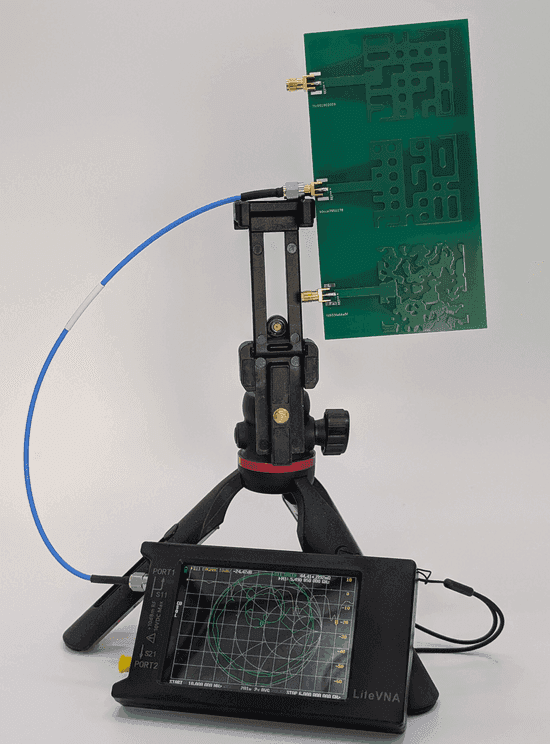
To most engineers, antenna design is “one of those witchcrafts you either know how to do, or you just don’t”. Janne’s research lets a cluster of Nvidia B200 GPUs brute-force antenna designs for manufacturing, the results are pretty surprising. - somethingfromnothing
ePaper Camera

Snap lo-fi pictures and transmit them over WiFi to your ePaper photo frame! - Adafruit Learning System
OpenClaw on Raspberry Pi
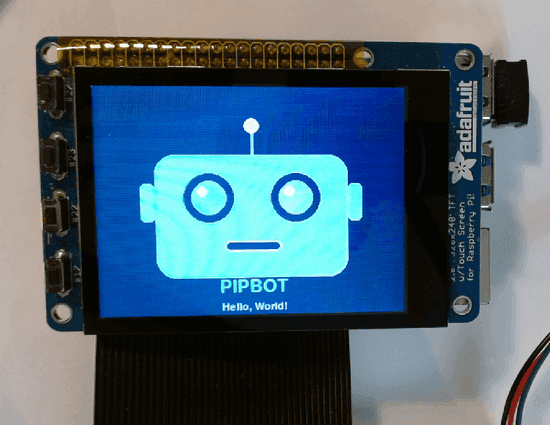
An experiment for giving an LLM agent full control over a Raspberry Pi and letting it interact with the physical world using peripherals such as a TFT display, sensors, and a USB camera. - Adafruit Learning System
Analog Clock with NTP Time

This project modifies an analog clock (the ones with hour and minute hands) to connect to a network time server, allowing it to display incredibly accurate time. - GitHub
Hacking the Adafruit IO Library
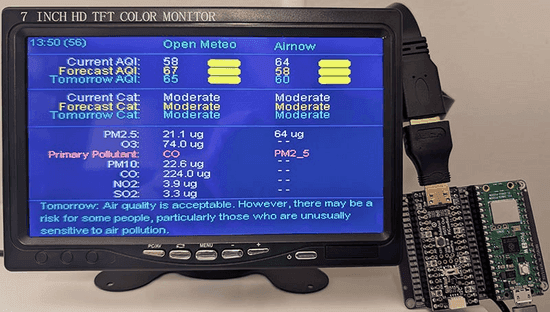
Our IoT Service, Adafruit IO, recently added a new API for grabbing air quality data from Open-Meteo (for international users) and AirNow (for US users). Danak hacks apart the CircuitPython library to add support for this new API. - Adafruit Learning System
IoT News and More!
WipperSnapper Hardware Catalog: “Works with WipperSnapper”
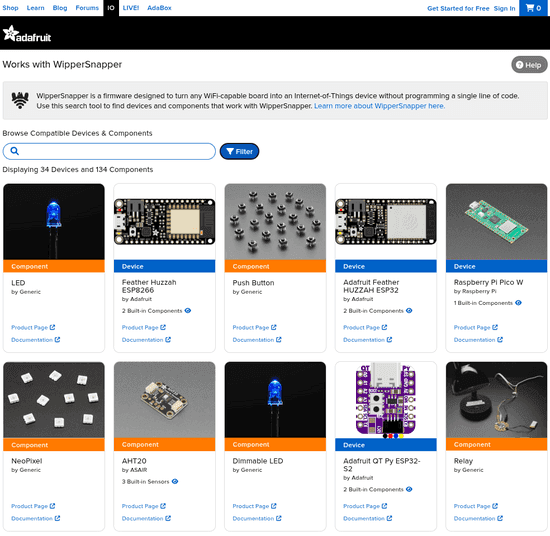
If you’ve ever thought to yourself, “I’d like to try out Adafruit’s no-code WipperSnapper firmware for my next project, but I’m not sure what hardware I can use!”, we’ve got just the thing for you! - Adafruit IO Blog
My smart sleep mask broadcasts users’ brainwaves to an open MQTT broker
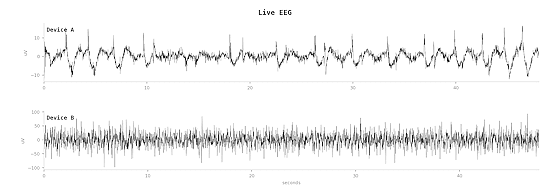
Aimilios Hatzistamou recently got a smart sleep mask from Kickstarter. What was not expected was the ability to read strangers’ brainwaves and send them electric impulses in their sleep. - Adafruit Blog
-
WipperSnapper Hardware Catalog

❄️ Deep winter greetings from the Adafruit IO team! ❄️
Have you ever thought to yourself…
“I’d like to use WipperSnapper for my next project, but I’m not sure what hardware I can use!”
If so, we’ve got just the thing for you! Introducing the…
Works with WipperSnapper
WipperSnapper, Adafruit IO’s no-code embedded and IoT project creation system, now supports so many popular devices (34) and components (134) it’s getting hard to think of a project you can’t put together with it.
So we created a new page, “Works with WipperSnapper”, to make it easy to plan your no-code projects and prototypes.
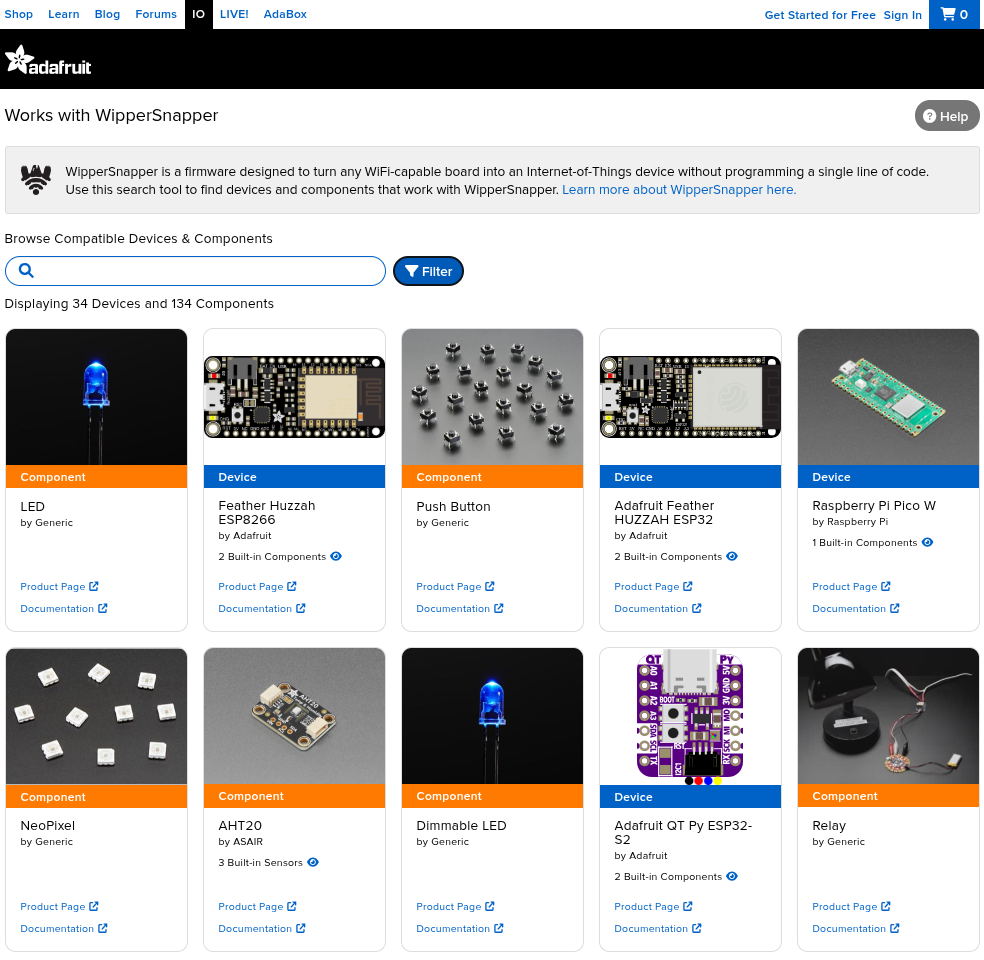
I’ll share a few of the cool features we packed into it.
It’s a Public Page
No account creation or login is required to browse through the catalog of WipperSnapper-compatible hardware. Confidently share that link with your friends!
Filters
There’s a lot of hardware here already, and the list will only grow. We added a filters menu to give a broad sense of what is available, and quickly pare down the copious results.
Currently, you can filter by:
- hardware categories, so you can see just devices, or just the components they control
- sensor packages, if you’ve got specific use cases in mind already
- hardware manufacturers, if you’ve got a favorite vendor you want to prioritize
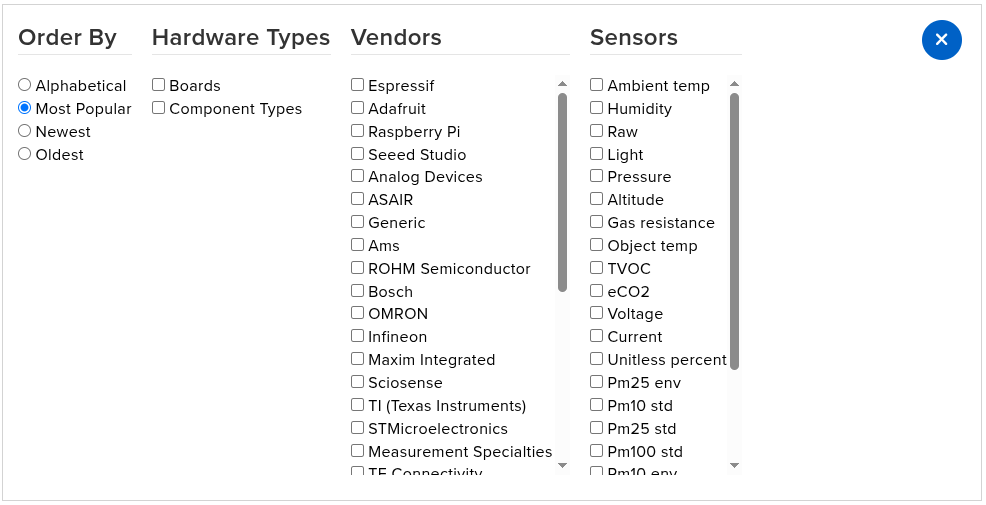
Order by What’s Interesting
Also in the filters menu is the “Order By” section. Maybe you need some inspiration? Sort by “Most Popular” and ride the hype wave. Or maybe you’re already an avid WipperSnapper yourself? Sort by “Newest” to see what’s been added lately.
Search for Specifics
There’s always that old standby: search! Type in exactly what you’re after and see what comes up. We’ve tried to index hardware across many dimensions, so if you type in “light” you’ll find every component with a light sensor in it, as well as any devices with light sensors build in.
Here’s a quick example. After typing in “feather display” we see a handful of results related to our popular Feather line of tiny-yet-mighty devices. Each item is either a Feather with a display built-in, or it’s a display component that’s frequently used with Feather boards. Pretty slick, right?
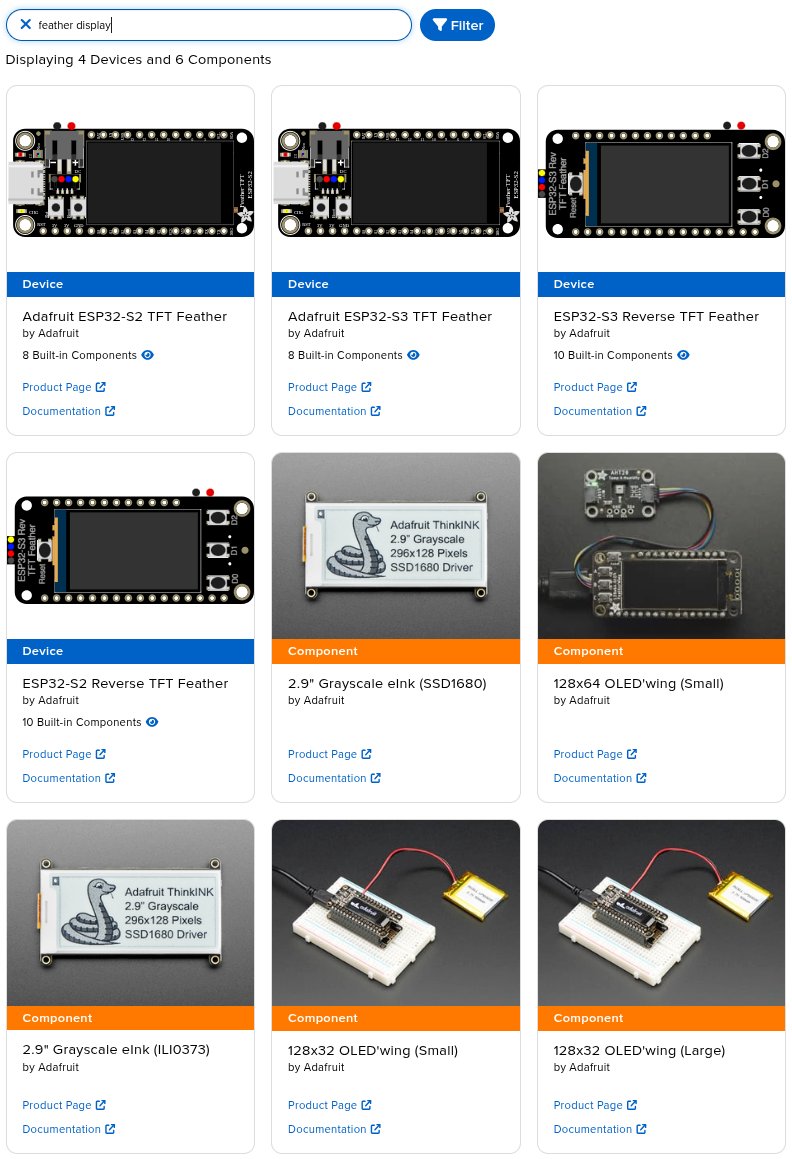
What’s Built-in?
Many devices come with components and sensors built-in. We wanted to share all that good stuff on this page, too. Simply touch or hover your mouse over the little blue eyeball and the built-in items will appear!
Here’s the ever-popular Adafruit Funhouse, showing off its impressive collection of ready-to-go silicon. As you can see, the Funhouse is one device with a dozen components, making it a great option for getting started with WipperSnapper!
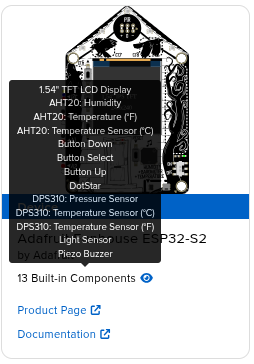
As always, if you have any suggestions or bugs to report about the new pages, please let us know in the forums.
-
Adafruit IoT Monthly: WiFi Tamagotchis, Ultra-Low Power Modes, and more!
IoT Projects
Acid Rain Detection
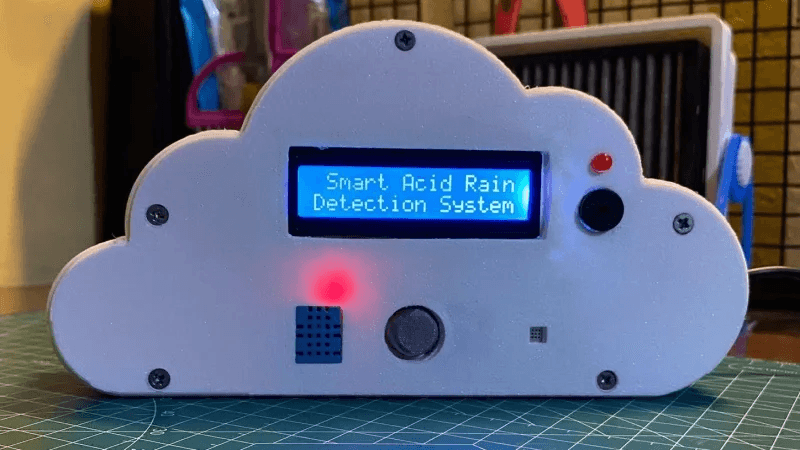
This project predicts “the chances of acid rain before it occurs by monitoring SO₂, NO₂, humidity, and temperature”. To do this, it reads from a set of sensors and uses an algorithm to calculate an “Acid Rain Risk Score”. - HackADay
ESP-DASH: On-Device Web Dashboard
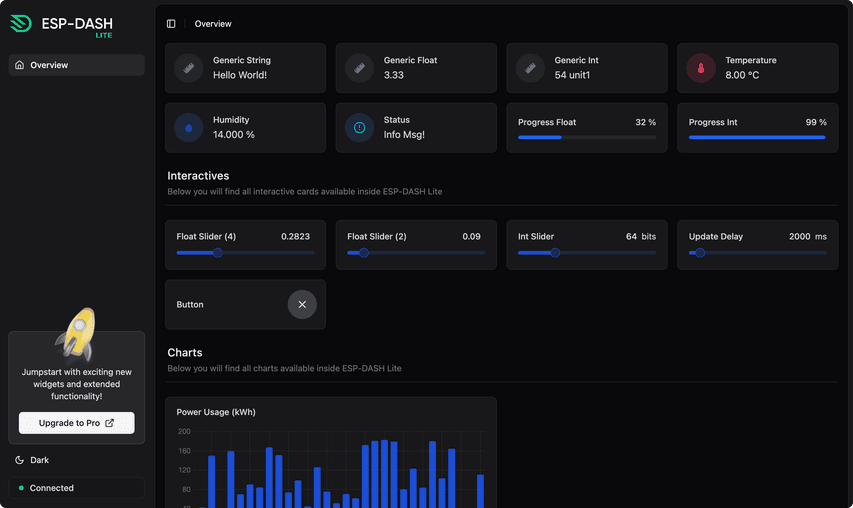
This open-source library includes charts, display cards, interactive buttons and many more components to create a perfect dashboard which is accessible locally via your IoT device’s IP. ESP-DASH does not require any kind of internet connection, everything is stored locally. - Adafruit Blog
TamaFi: Tamagotchi-like WiFi Hunter
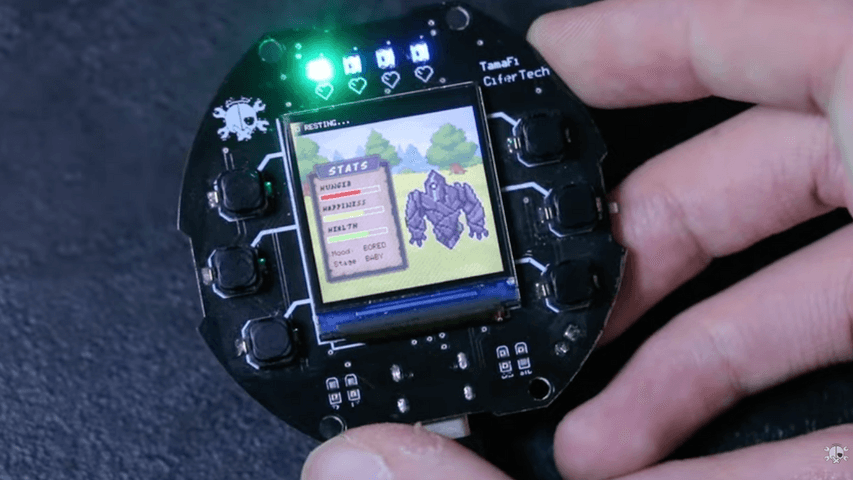
Keep this pocket monster happy, healthy and well fed with WiFi signals. This is version two from CifterTech. The goal was to have an updated version of the classic Tamagotchi that feels more alive by acting on its own. They already have more ideas for the next version, so stay tuned. - Adafruit Blog
eInk Literature Quotes Clock
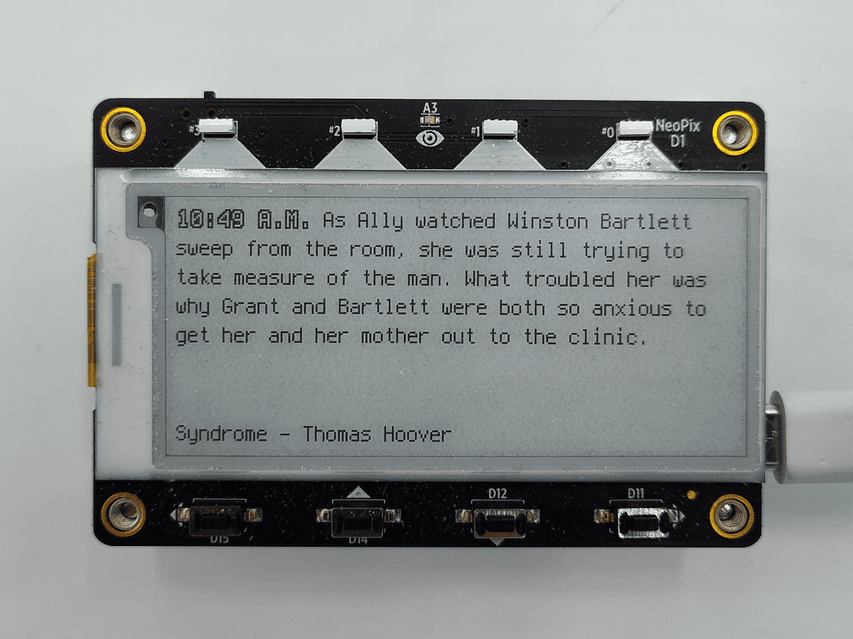
A clock that always shows quotes from a book to reference the passage of time. The quotes are fetched from Project Gutenberg and displayed on an eInk display. - Adafruit Learning System
“Freeing” the QingPing Air Quality Monitor 2
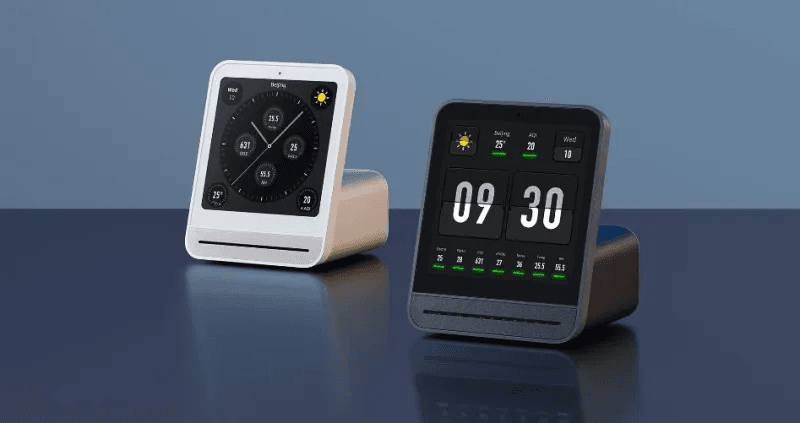
Releasing a QingPing sensor from Xiaomi’s IoT ecoystem so it can be used on your home server/system. - HackADay
Quote Receipts

A thermal receipt printer modified to log and store silly quotes. This is a very fun weekend project. - watch the build video here. - theodore
As Seen on Show & Tell: Ultra-Low-Power WipperSnapper & E-Paper Camera Frame

From the weekly Adafruit Show & Tell! Brent stopped by to show-off ultra-low-power feature he’s adding to Adafruit WipperSnapper, then it was followed by an an e-paper camera mashup that captures, dithers, and displays photos as a magnetic frame - YouTube
IoT News and More!
Memory-driven Price Increases for Raspberry Pi

Due to unprecedented and continued rise in cost of DDR4 memory, Raspberry Pi recently announced price increases to some of their Raspberry Pi 4 and 5 products. - Raspberry Pi
Autonomously navigating the real world: lessons from the PG&E outage

In December, a utilities outage cut power to one-third of San Francisco. Waymo’s engineering blog details the unique challenge of this situation for self-driving vehicles. - Waymo
Espressif Systems at CES: ESP32-E22 Wi-Fi 6E SoC and ESP32-H21 BLE MCU
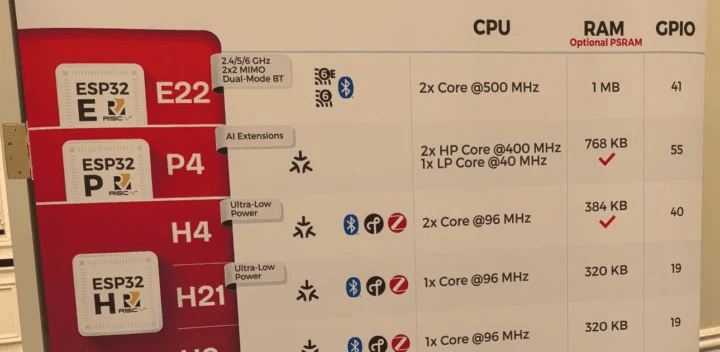
Espressif showcased two of its upcoming products at CES 2026, the ESP32-E22 for WiFi 6E and the ESP32-H21 for battery powered Bluetooth devices. - cnx-software
Bose is open-sourcing its old smart speakers instead of bricking them

This is a great step forward for corporations looking to kill support for cloud-enabled products! Bose is open-sourcing the API documentation for these cloud-powered speakers prior to discontinuing support. - The Verge
-
Adafruit IoT Monthly: The 2025 Recap Issue!
Editor’s Note - Happy Holidays!

Reader,
Hello! I’m Brent. I am an engineer who works for Adafruit Industries on all kinds of things, including the newsletter you’re reading now.
This newsletter is distributed only once per month, giving me enough time to gather information from around the internet for you. This isn’t an industry newsletter, nor a newsletter covering every single project or news item. Instead, it’s a collection of projects and news that I find genuinely interesting. If you have feedback for improving this newsletter, please let me know. I’m always looking for ways to make it better. Please email us at iotnews @ adafruit.com (remove the spaces!).
As a tradition, I typically write a newsletter that recaps my favorite things from the previous year. This issue lets me reflect on the past year and share with you some of the interesting projects and news that I’ve come across.
I’d also like to extend a “hug report” (Adafruit parlance for “thank you”) to our copyeditor, Anne, for her behind-the-scenes editing work on these newsletters for the past 5 years.
I hope the rest of your holiday season is wonderful, and I look forward to sharing more IoT news with you in the coming year,
Brent
p.s. Quick plug: We wrote a shopping guide! This newsletter is brought to you for free (no spam and we are 100% supported by you, the customer). We’ve asked our team of engineers/designers/developers who work on our free IoT Platform, Adafruit IO, to round up their favorite products on the Adafruit Shop for the holiday season.
2025 IoT Projects, in Recap
Holiday IoT Switch

This project was in the February 2025 newsletter. It did not make it into the IOT Monthly in time for the holidays but, fear not, I’m bringing it back for this issue. This switch uses a massive 10mm diameter arcade button to wirelessly send a message to a smart outlet to turn on the holiday lighting. - Adafruit Learning System
Engineering for Slow Internet in Antarctica

While working in Antarctica, brr “had access to the Internet only through an extremely limited series of satellite links provided by the United States Antarctic Program”. Modern websites often load up to 20 MB of Javascript, which makes connecting to the Internet in Antarctica a challenge. Brr’s exploration into engineering a faster, slow, internet is detailed in their blog post. - brr
Rain Sensing Umbrella Stand

A simple, compact umbrella stand that reads the weather forecast and lights up to notify you if rain is expected that day. - Adafruit Learning System
An $8 smart outlet to avoid brainrot
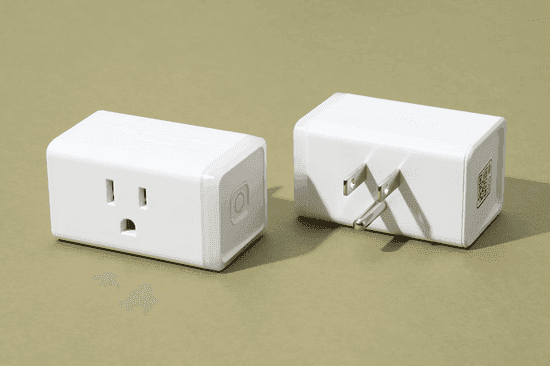
Neil Chen used an $8 smart outlet to avoid “brain rot”. When plugged in, a script blocks websites like X, Instagram, YouTube and Reddit, allowing him to focus and not get distracted by the Internet. - Neil Chen
ChatGPT for Rotary Phones

Pollux Labs transformed a rotary phone into a novel way to interface with ChatGPT. Dialing “1” will activate OpenAI’s Whisper API. The phone interacts with you through its handset. - hackster.io
2025 IoT News, in Recap
Arduino and Edge Impulse Join Qualcomm Technologies

Qualcomm Technologies acquired embedded ML platform Edge Impulse and open-source hardware company Arduino in 2025.
A Block-based Action Engine comes to Adafruit.IO

In Adafruit IO, Actions are a way to do something when a certain situation occurs. We’ve integrated Blockly within Adafruit IO to allow easy creation and editing of Actions on Adafruit IO. 2025 brought this new feature to life, along with lots of new projects to demonstrate its capabilities.
The Humane AI Pin Saga

The main story in February 2025 was the demise of Humane’s AI pin. This has been a poor rollout for one of the first consumer-focused AIoT hardware. After a large number of bad reviews spelled danger for the AI Pin - reports of units being returned more than they are sold and battery fire concerns made headlines. This all culminated in HP acquiring Humane in February for $116 million. As part of the acquisition, AI Pins stopped functioning on February 28, 2025. If you own one of these $699 devices, there is still hope! A recent WIRED article details a group working to keep the devices online.
-
Adafruit IoT Monthly: Dial-Up WiFi, MIDI Juggling Balls, and more!
IoT Projects
Listen to Wi-Fi data, just like the dial-up days!
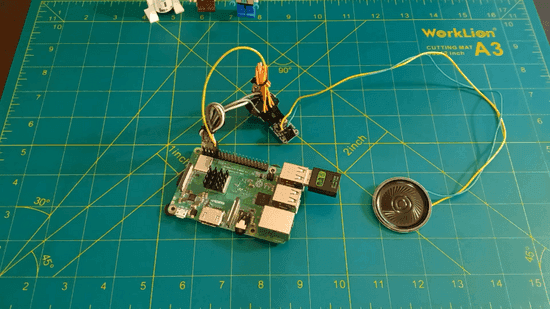
AOL recently disconnected their dial-up service. Nick Bild said he “felt sad” about the “end of an era”. He built a project to capture Wi-Fi data and convert it to audible signals. While dial-up was sending analog signals (audio), this project mimics this by modulating the digital Wi-Fi packets into audible noises and plays it back through a speaker. The link past the break has a great write-up about how Nick got this fun project working. - HackaDay
Mini UPS for your Wi-Fi Router

A simple UPS (uninterruptible power supply) built out of low-cost parts to keep a WiFi router online during a short power outage or spike. - HackaDay.io
Rugged LoRa Repeater for Off-Grid Communications
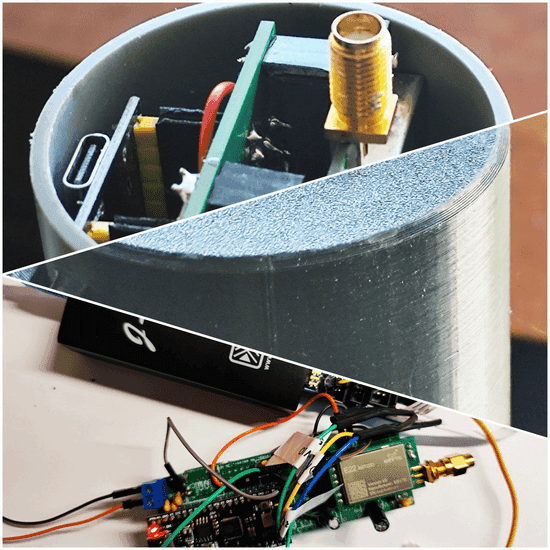
While increasing the LoRa (Long Range) radio communication output’s power is illegal, Bertrand Selva developed a repeater to broadcast signals over extremely long distances. The repeater is “ultra-discreet”, uses low-cost materials (D batteries, standard PVD pipe fittings), and can run over five years in an off-grid location. - HackaDay.io
My fan worked fine, so I gave it WiFi

Ellis Clayton designed a fully reversible modification for a Vornado 633DC fan to control it remotely over WiFi. The final result is concealed entirely within the fan’s housing, leaving no visible modification. - Adafruit Blog
Pool Party Notifier

Build an internet-connected pool notifier to alert the neighborhood that your pool party is underway! When your pool is ready for guests, press a button on a web dashboard to send the flag up. We’ve also designed a 3D-printed enclosure to house the project. - Adafruit Learning System
ESP-NOW LED Juggling Balls

Interactive, wireless musical LED juggling balls using the low latency ESP-NOW protocol. The juggling balls can wirelessly trigger MIDI notes based on catch detection with an accelerometer, and bridge messages to your computer or USB Host synthesizer. - Adafruit Learning System
IoT News and More!
Nest Gen1/Gen2 Get a New Lease on Life

Breathing new life into bricked and outdated Nest Generation 1 & 2 thermostats, this project replaces the proprietary Google firmware with open-source firmware, allowing users to regain control over their devices. This firmware is also completely decoupled from Google’s servers and services. - GitHub
Ikea Launches New Smart Home Product Line

No more ZigBee hubs for IKEA smart homes! IKEA is finally launching 21 new smart home products — all built to work with the Matter standard. - IKEA
Raspberry Pi Unveils the $18 Compute Module RP3
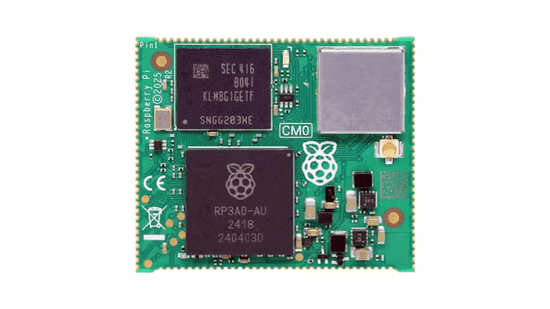
Low-cost castellated “stamp” style module borrows the RP3 from the Raspberry Pi Zero 2 W and puts it in a new form factor for Chinese customers. - Hackster
« Newer
Older »
